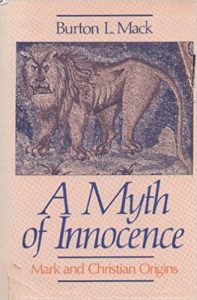 In A Myth of Innocence: Mark and Christian Origins Burton L. Mack crudely summarizes what he sees as the legacy Mark’s Gospel in the form of the Christian myth that has become the lens through which Western (particularly American) culture has viewed the world:
In A Myth of Innocence: Mark and Christian Origins Burton L. Mack crudely summarizes what he sees as the legacy Mark’s Gospel in the form of the Christian myth that has become the lens through which Western (particularly American) culture has viewed the world:
The Markan legacy is a myth of innocence that separates those who belong to the righteous kingdom within from those without. The boundaries, however, are not at all static. The borders shift as conflicts arise both within and without. Separation occurs when the mission to convert the other is thwarted. Judgments fall to support the righteous cause as justified and the recalcitrant other as wrong. A period of time is devoted to patient proclamation, but an either/or approach to issues excludes the middle range of compromise. Conversion means loyalty to the cause of the righteous; rejection means consignment to the forces of opposition. Ultimately, should the mission be threatened with failure, victims may be sacrificed. That is because the cause is righteous and must somehow prevail. The sign of failure, a crucifixion, also serves as the sign of victory. If all else fails, both martyrdom and the destruction of the wicked can be imagined as the means for vindicating the cause and trusting in the power of God to resurrect a new creation from the ashes. (p. 372)
I don’t know if this view is a pop rationalization or if it has roots in serious psycho-sociological research. (I suspect it too glibly side-steps politico-economic structures and universal geopolitical realities, as well as something distinctively Manichaean within America’s soul) But it sounds plausible and interesting. Broken down it looks like this: Continue reading “The Markan Legacy: A Myth of Innocence”
